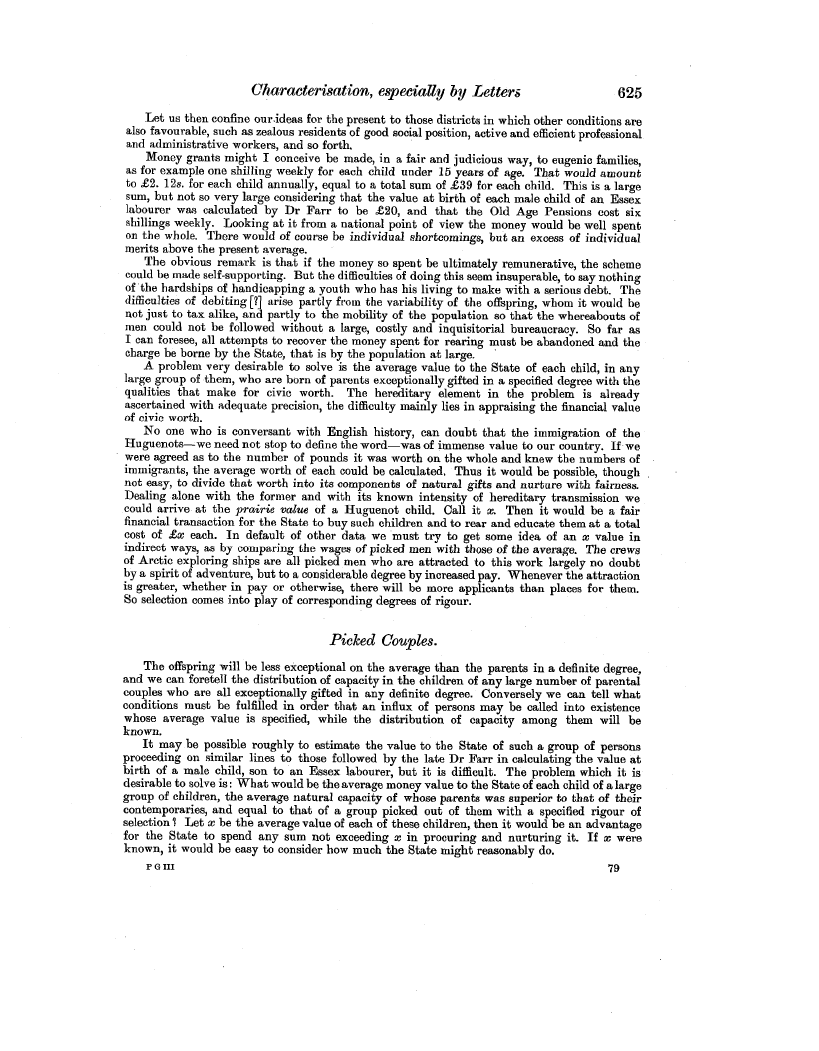| ||||||

OCR Rendition - approximate
Characterisation, especially by Letters 625 Let us then confine our.ideas for the present to those districts in which other conditions are also favourable, such as zealous residents of good social position, active and efficient professional and administrative workers, and so forth. Money grants might I conceive be made, in a fair and judicious way, to eugenic families, as for example one shilling weekly for each child under 15 years of age. That would amount to £2. 12s. for each child annually, equal to a total sum of £39 for each child. This is a large sum, but not so very large considering that the value at birth of each male child of an Essex labourer was calculated by Dr Farr to be £20, and that the Old Age Pensions cost six shillings weekly. Looking at it from a national point of view the money would be well spent on the whole. There would of course be individual shortcomings, but an excess of individual merits above the present average. The obvious remark is that if the money so spent be ultimately remunerative, the scheme could be made self-supporting. But the difficulties of doing this seem insuperable, to say nothing of the hardships of handicapping a youth who has his living to make with a serious debt. The difficulties of debiting[?] arise partly from the variability of the offspring, whom it would be not just to tax alike, and partly to the mobility of the population so that the whereabouts of men could not be followed without a large, costly and inquisitorial bureaucracy. So far as I can foresee, all attempts to recover the money spent for rearing must be abandoned and the charge be borne by the State, that is by the population at large. A problem very desirable to solve is the average value to the State of each child, in any large group of them, who are born of parents exceptionally gifted in a specified degree with the qualities that make for civic worth. The hereditary element in the problem is already ascertained with adequate precision, the difficulty mainly lies in appraising the financial value of civic worth. No one who is conversant with English history, can doubt that the immigration of the Huguenots-we need not stop to define the word-was of immense value to our country. If we were agreed as to the number of pounds it was worth on the whole and knew the numbers of immigrants, the average worth of each could be calculated. Thus it would be possible, though not easy, to divide that worth into its components of natural gifts and nurture with fairness. Dealing alone with the former and with its known intensity of hereditary transmission we could arrive at the prairie value of a Huguenot child. Call it x. Then it would be a fair financial transaction for the State to buy such children and to rear and educate them at a total cost of £x each. In default of other data we must try to get some idea of an x value in indirect ways, as by comparing the wages of picked men with those of the average. The crews of Arctic exploring ships are all picked men who are attracted to this work largely no doubt by a spirit of adventure, but to a considerable degree by increased pay. Whenever the attraction is greater, whether in pay or otherwise, there will be more applicants than places for them. So selection comes into play of corresponding degrees of rigour. Picked Couples. The offspring will be less exceptional on the average than the parents in a definite degree, and we can foretell the distribution of capacity in the children of any large number of parental couples who are all exceptionally gifted in any definite degree. Conversely we can tell what conditions must be fulfilled in order that an influx of persons may be called into existence whose average value is specified, while the distribution of capacity among them will be known. It may be possible roughly to estimate the value to the State of such a group of persons proceeding on similar lines to those followed by the late Dr Farr in calculating the value at birth of a male child, son to an Essex labourer, but it is difficult. The problem which it is desirable to solve is : What would be the average money value to the State of each child of a large group of children, the average natural capacity of whose parents was superior to that of their contemporaries, and equal to that of a group picked out of them with a specified rigour of selection? Let x be the average value of each of these children, then it would be an advantage for the State to spend any sum not exceeding x in procuring and nurturing it. If x were known, it would be easy to consider how much the State might reasonably do. P a iii 79
|